Pasture-raised, organic, free range, natural…these are some of the more common claims you’ll find on chicken and chicken eggs in the grocery store.
If you’ve ever wondered what these different labels mean, and whether they actually matter, you’re not alone. I’ve been buying pasture raised chicken and eggs from small farms for three years and I’ve done a lot of research in that time.
It’s safe to say I know quite a bit more about the inner workings of the chicken industry than a regular person usually would. And today I want to share this information with my favorite readers like you, and decipher the chicken labels!
So what is pasture-raised versus organic and free range chicken? Is one more humane than the other? What about vegetarian-fed and antibiotic-free chicken? Maybe you’ve also wondered if it’s worth paying more for pasture-raised.
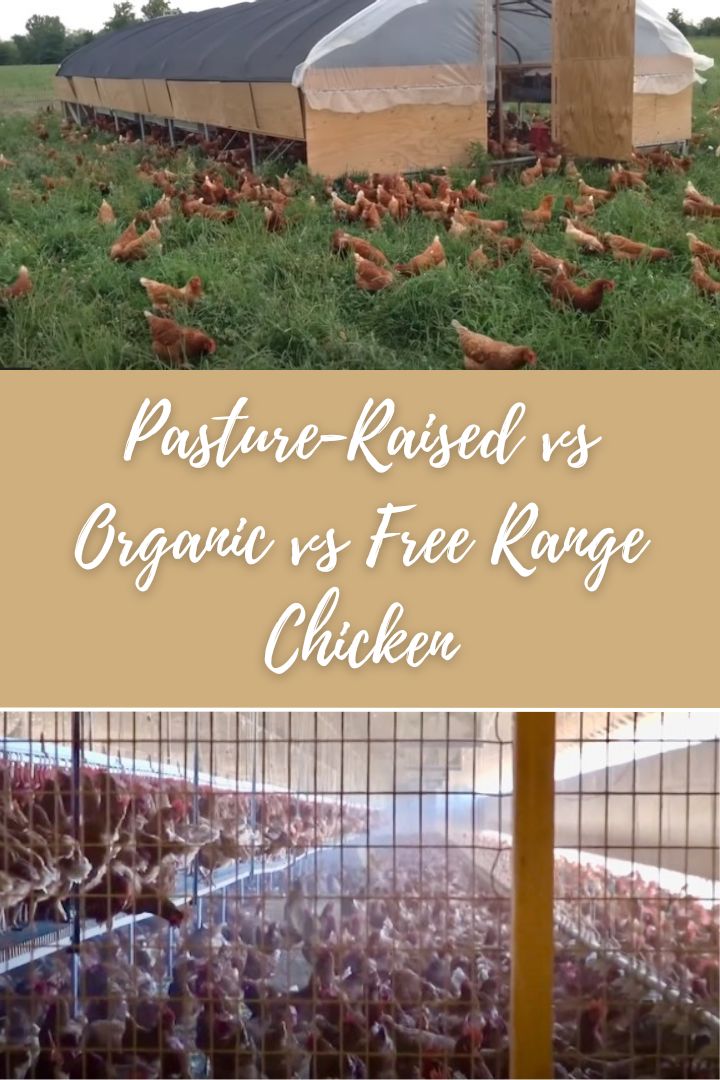
When it comes to the different egg labels, these are topics I’ve covered in my guide to pasture raised eggs and free range versus pasture-raised eggs.
But I haven’t yet written about pasture-raised versus organic and free range chicken meat. I’ll start by setting a baseline of how chickens are raised in factory farms.
Table of Contents
- Factory Farmed Chicken
- Pasture-Raised Chicken
- Organic Chicken
- Free Range Chicken
- Which is Better?
- Where to Buy
- Frequently Asked Questions
How Chickens are Raised in Factory Farms
Today about 99% of the chickens being farmed in the United States are within the factory farming system. This is most of the chicken you’ll find at the grocery store.
Factory chicken farming is not a pretty sight.
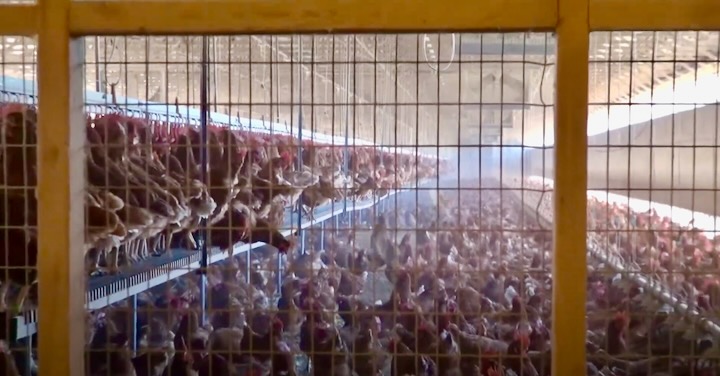
Picture thousands of chickens inside a crowded dirt-floor barn with feeding stations set up every few feet. The chickens are kept inside for their entire lives. These conventional chicken farms are truly a factory created to quickly grow chickens so they can be slaughtered and made ready for your family’s dinner table.
Conventional factory farms are about as glamorous as they sound, to be honest.
The good news is, there are an increasing number of small farms taking it upon themselves to raise meat chickens (aka broiler chickens) in a more natural and humane way.
I’m referring to pasture-raised chicken, and I’ll explain what that means next.
What is Pasture-Raised Chicken?
Pasture-raised means the chickens spend their days outside on pasture where they can forage for bugs and grasses. Foraging, pecking and being outside is very natural behavior for a chicken.
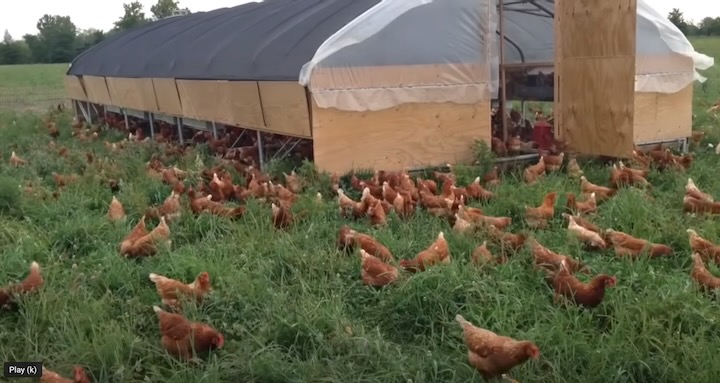
Though they spend most of their time on pasture, pasture-raised chickens always have access to supplemental feed, and shelter for protection from predators and poor weather.
Unlike other labels often found on meat, such as “certified organic” and “free range”, the United States Department of Agriculture (USDA) does not monitor or have labeling guidelines for pasture-raised claims. When you buy pastured chicken you’re making a decision in good faith towards the farm that raised it.
True pasture-raised chicken will have plenty of access to fresh grasses and space to walk around. Dirt lots that have been pecked clean of grass and forage are not pastures…but they are a reality of chicken farming when pasture rotation is not practiced.
What is pasture rotation?
Pasture rotation is an important practice when farming pasture-raised animals. Pasture rotation means the animals are rotated to a new fenced off area of pasture every few weeks. This gives the grazed pasture a chance to regenerate while the chickens are foraging elsewhere.
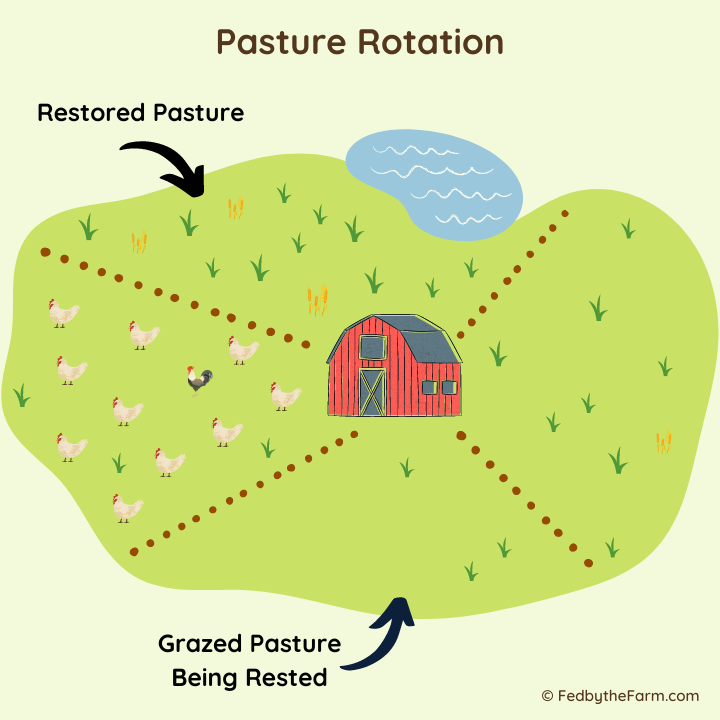
In a pasture rotation set up, the animals are not brought back to an area of pasture until it is restored and the grasses are growing high again. This is the cycle of pasture rotation.
If too many chickens (or any pasture-raised animals) are pastured in the same area month after month, eventually they will eat all the natural vegetation in sight and you’ll be left with a plot of dirt.
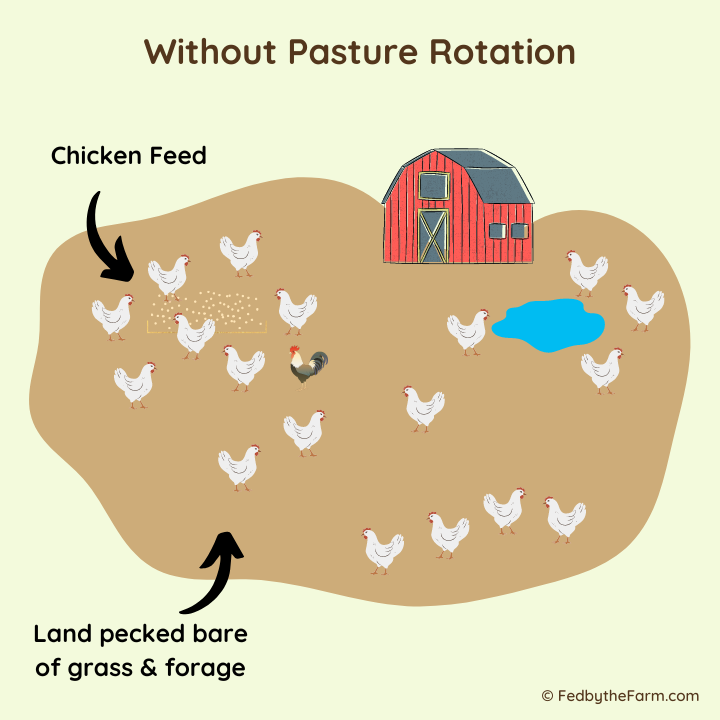
Without pasture rotation, chickens rely almost entirely on their supplemental feed, which is typically corn and soy and far less healthy than the wild forage they are evolved to eat.
If you’d like to watch a video of what pasture rotation looks like on a real farm, check out how we move 1000 hens to fresh pasture every day.
Because there isn’t a government body monitoring the pasture-raised label, a couple independent certifiers do exist that will certify chicken as pasture raised. I’ll explain those next.
Pasture-raised certifications
Real Organic – The Real Organic Project was started by farmers to protect the meaning of organic. If you see meat with the Real Organic seal, it means the meat is USDA certified organic AND the animals were raised on pasture, not in confinement. Unlike other third party certifications, there are no fees for a farm to be part of the Real Organic certification program.
Certified Animal Welfare Approved by AGW – The Certified Animal Welfare labels means the animal was raised humanely on pasture . This is an independent third-party certification and requires an annual inspection by AGW.
Certified Humane® “Pasture Raised” – The Certified Humane® “Pasture Raised” requirement is 1000 birds per 2.5 acres (108 square feet of outdoor space per bird) and the fields must be rotated. The hens must be outdoors year-round, with mobile or fixed housing where the hens can go inside at night to protect themselves from predators, or for up to two weeks out of the year, due only to very inclement weather.
Know that pasture raised does not mean organic. I’ll explain what is organic chicken next.
What is Organic Chicken?
In order for chicken to be labeled as certified organic it must adhere to rules put in place by the USDA. USDA certified organic guidelines for meat require that the animals are fed 100% organic and non-GMO feed and forage, not given growth hormones or antibiotics and have the ability to graze on organic pasture.
As for organic meat, regulations require that animals are raised in living conditions accommodating their natural behaviors (like the ability to graze on pasture), fed 100% organic feed and forage, and not administered antibiotics or hormones.
Source: U.S. Department of Agriculture, Organic 101
However, chickens are exempt from the requirement that they graze on pasture. In the words of the USDA, this is because “maintaining vegetation cover is a challenge“.
hmmmm…
In other words, organic chicken farms are not required to keep their chickens out on pasture. Instead, organic chicken is supposed to have “access to the outdoors…and direct sunlight” but there are so many loopholes in the regulations that confined chicken is often labeled organic.
I would agree that maintaining vegetation cover is a challenge. But as I covered earlier, it is possible to raise chickens on green pasture when the farm practices pasture rotation.
Pasture rotation does require extra steps and therefore increases the cost of the chicken. Where the average chicken factory is trying to quickly grow cheap chicken for consumers, shortcuts are necessary.
Moving on to what happens when the organic chickens are processed and packaged. It is prohibited to add artificial colors, flavors or preservatives to organic meat. And the meat itself may not be genetically modified (ex. gene deletion, gene doubling). The processing facility must also be inspected by an approved organic certifier.
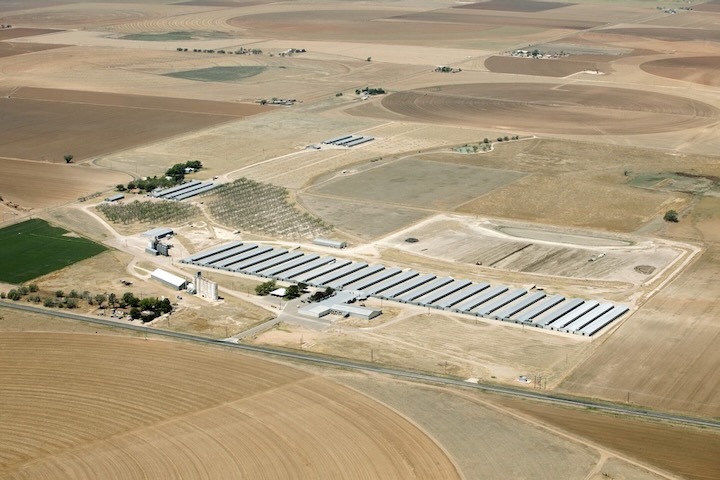
The aerial photo above shows Chino Valley Ranchers. They farm certified organic eggs laid by “happy chickens” according to their marketing claims. But where are the chickens? Inside those giant barns.
These are not organic chicken farms, these are organic chicken factories.
Organic Chicken vs Conventional Chicken
One of the few things that distinguishes organic chicken from conventional factory farmed chicken is that organic chicken must only be fed an organic diet that is not genetically modified.
The main difference between organic chicken and other chicken is that organic chicken must only be fed organic feed that is non-GMO.
That said, whether the feed is actually organic is another point we can’t have complete confidence in as the case of Randy Constant proves. In 2019 Randy was sentenced to prison for fraud after it was proved that he sold $120 million dollars worth of fake organic grain in the USA between 2010 and 2017. Most of the grain was bought by farmers as animal feed.
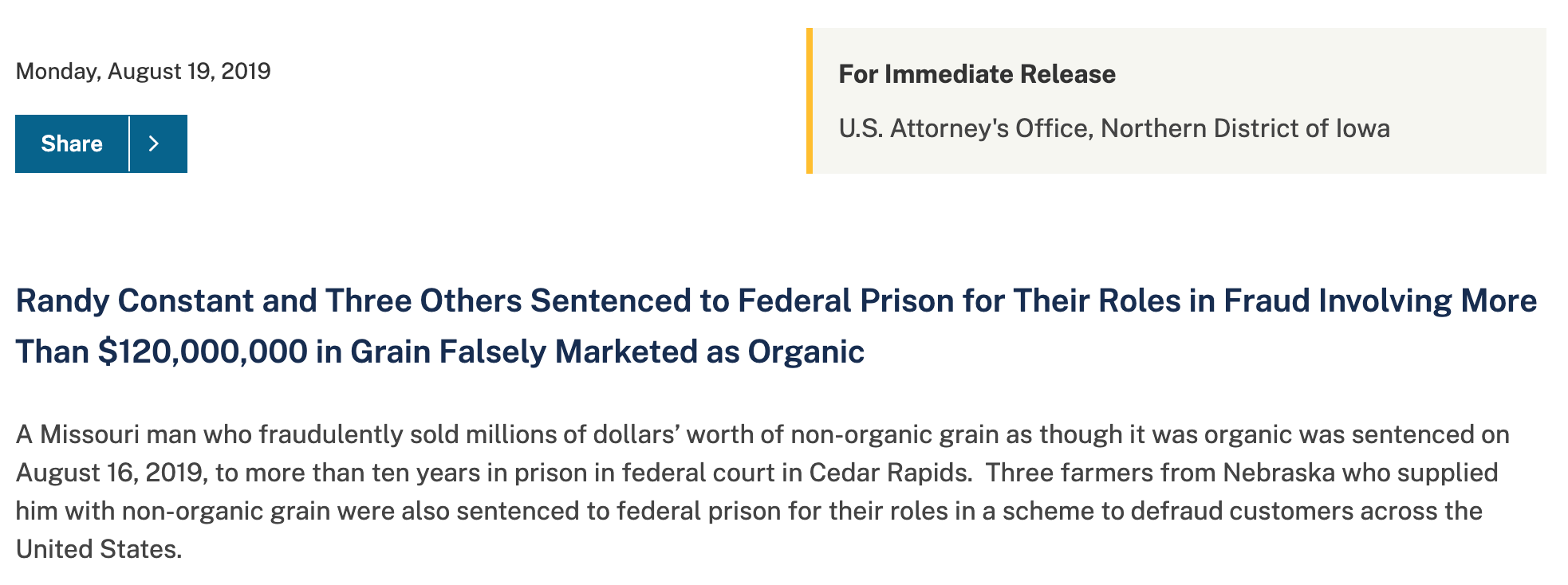
I don’t mean to be all doom and gloom here. I’m a big fan of the certified organic label and think it’s a step in the right direction.
But certified organic is not perfect and we as consumers should know this and be empowered to do our own research and make our own decisions.
How to research organic chicken brands
According to the USDA’s Economic Research Service, Americans spent more than $749 million on certified organic chicken in 2016. And more than 7 out of 10 shoppers have purchased organic chicken. Unfortunately they may not be getting what they assume they are getting.
More than 7 out of 10 shoppers have purchased organic chicken.
If you are a concerned consumer I highly recommend reading For the Birds: How to Recognize Authentic Organic Chicken and Turkey
I also recommend checking your favorite brands of organic chicken against the Cornucopia Institute’s Organic Poultry Scorecard. You may be surprised to see that popular brands of organic chicken like 365 Organic, Wild Pastures and Greenwise from Publix only receive 1 out of 5 stars.
Ok, so I’ve covered what is pasture raised versus organic chicken. Now how about free range chicken, what does free range mean…
What is Free-Range Chicken?
According to the USDA, producers of chicken labeled free-range or free roaming must be able to show that the chickens were given outdoor access.
Within a free-range model of farming there will be a barn where the chickens are kept and doorways to a fenced in outdoor area. The chickens have free range of the indoor and outdoor space and are not confined to cages.
Most of the definitions related to free range chicken are in reference to egg production and not broiler chickens. In fact, aside from the above, there is very little out there is terms of official requirements for labeling chicken meat as free range.
Know that free range is not the same as pasture raised. But in my experience, what free range chicken farming actually looks like does vary widely. This is why it’s best to research the individual farm or company you’re buying from.
Best case free range chicken is quite similar to pasture raised and something you’ll find on small family farms.
Worst case free range chicken from the industrial meat industry looks more like the mosh pit of a Metallica concert…minus the joy. It’s crowded, it’s chaotic and it’s hard to get to the bathroom, let alone find the door to go outside and get some fresh air.
Which is Better: Pasture-Raised vs Organic vs Free Range
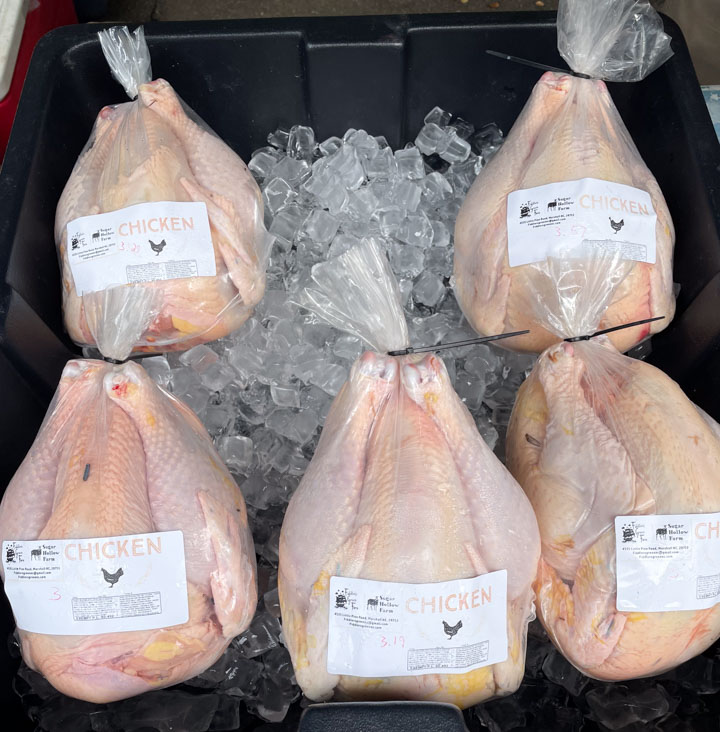
Phew, that was a lot of information, and I commend you for caring enough to read this far.
So knowing all of this, what do I consider to be the best choice when it comes to chicken?
A combination of pasture-raised and organic is what I consider the best chicken to buy.
With pasture-raised organic chicken you are assured that:
- the chickens are kept on pasture during the day
- AND that the pasture is not sprayed with pesticides and herbicides
- AND that the supplemental feed they are given is organic and non-GMO.
If I had to choose between buying a chicken that was only either pasture-raised or organic or free range, the pasture raised chicken would be my first choice. Yes, I would chose pasture-raised chicken over organic chicken.
Where To Buy Pasture-Raised Chicken
If you’d like to start buying pasture raised chicken I’ll show you how to find it. Know that you will probably not find pasture raised chicken at a grocery store.
Local Farms and Farmers Markets: The best place to buy pasture-raised chicken is direct from local farms. I buy pasture-raised chicken direct from local farmers at the farmers market. And sometimes I’ve visited a farm in person to buy their chicken, eggs, pork and grass-fed beef.
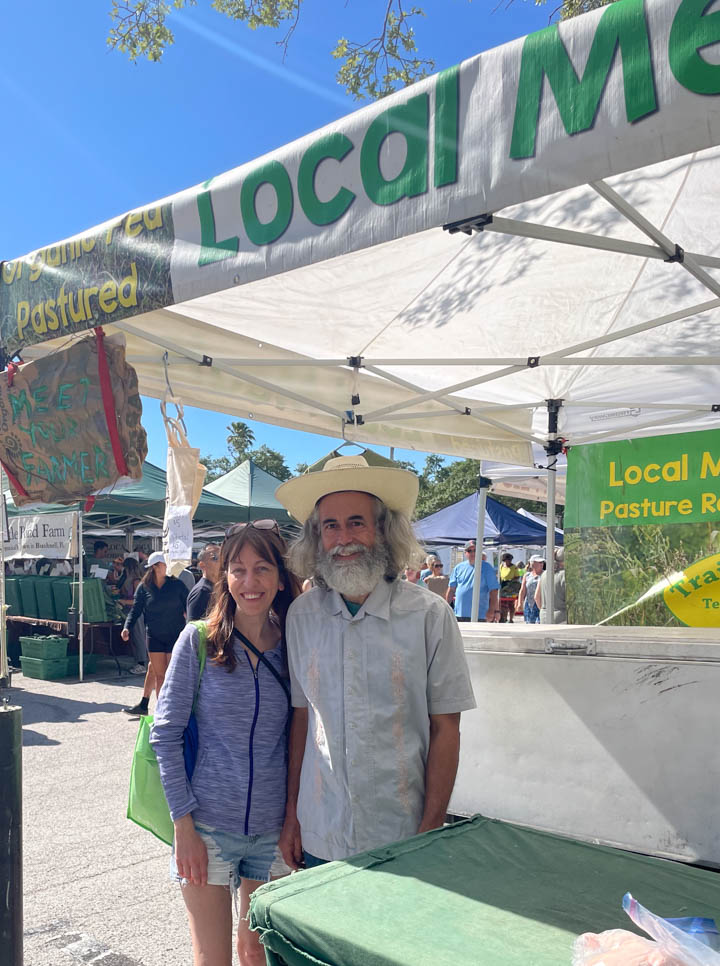
Online Meat Delivery Service: If there isn’t a farm near you that sells pasture-raised chicken you could buy it online through a farm that provides meat delivery service. One responsible farm I know of that sells pastured chicken and offers shipping is White Oak Pastures in Georgia. But there are others.
Local Butcher Shops: Some butchers sell meats from local farms and this could include pasture raised chicken. But be aware, the fact that they are selling chicken from local farms does not mean the chicken is pasture-raised, so be sure to ask for the specifics.
Frequently Asked Questions about Chicken Labels
What is the Certified Humane Label on chicken?
Certified Humane is an independent non-profit certification organization for the humane treatment of farm animals. You might have noticed their label on chicken and eggs in your local grocery store. Participation for poultry and egg producers is optional and comes with a cost, but it’s one way a farm can assure its customers that their animals are raised in a humane way.
What is natural chicken?
According to the USDA chicken labeled as “natural” has no artificial ingredients or colors added and has not been processed in a way that alters what the product is. For example, a package of chicken legs can be labeled “natural”, but a package of chicken nuggets can not be labeled as natural. Be careful though, with a little trickery those chicken nuggets can be labeled as “Made with all natural ingredients”. Do you spot the difference?
Why is chicken labeled as having “no hormones”?
If you buy chicken in the grocery store and notice it’s accompanied with “no hormones” marketing statements this is a bit of a trick. In the United Sates it’s actually illegal to give growth hormones to meat chickens. For this reason, the only way a chicken producer is allowed to put the “no hormones” statement on their packaging is if they follow it with the clarification that “Federal regulations prevent the use of hormones”. In other words, all of the chicken sold in the United States is free of hormones, regardless of whether the packaging states this.
What does the “antibiotic free” label mean on chicken?
Like humans, chickens sometimes get sick and when they do it may be necessary to give that chicken antibiotics. Once a chicken has been treated with antibiotics it can no longer be labeled “antibiotic free”. Chickens that received antibiotics can also no longer be sold as organic as organic guidelines prevent the use of antibiotics.
So if you’re wondering whether antibiotics may linger in the meat of the chicken that you later consume, the answer is no, so long as you’re buying antibiotic free, or organic chicken.
Is vegetarian fed chicken better?
If you browse the chicken section of your grocery store’s meat department (or the egg aisle!) you’ve no doubt noticed vegetarian fed chicken. It’s stated proudly as if it’s a good thing. It’s not. Chickens are naturally omnivores, meaning they eat plants and animals. Stating that your chickens were vegetarian tells me they never set foot outside a day in their life. Because if they did, they surely would have been eating bugs off the ground.
What does cage-free chicken mean?
Cage-free means the chickens are not confined to cages and are able to move around inside the barn where they live. These barns are all to often over-crowded and dirty. Certainly not the best life for a chicken or hen. But this is a step up from chickens who live in battery cages as part of the caged chicken industry.
—
I buy a whole pasture raised chicken from the farmers market once or twice a month. I find this more economical than buying a package of just chicken breasts or legs. Here’s how to roast a whole pasture raised chicken – it’s delish!

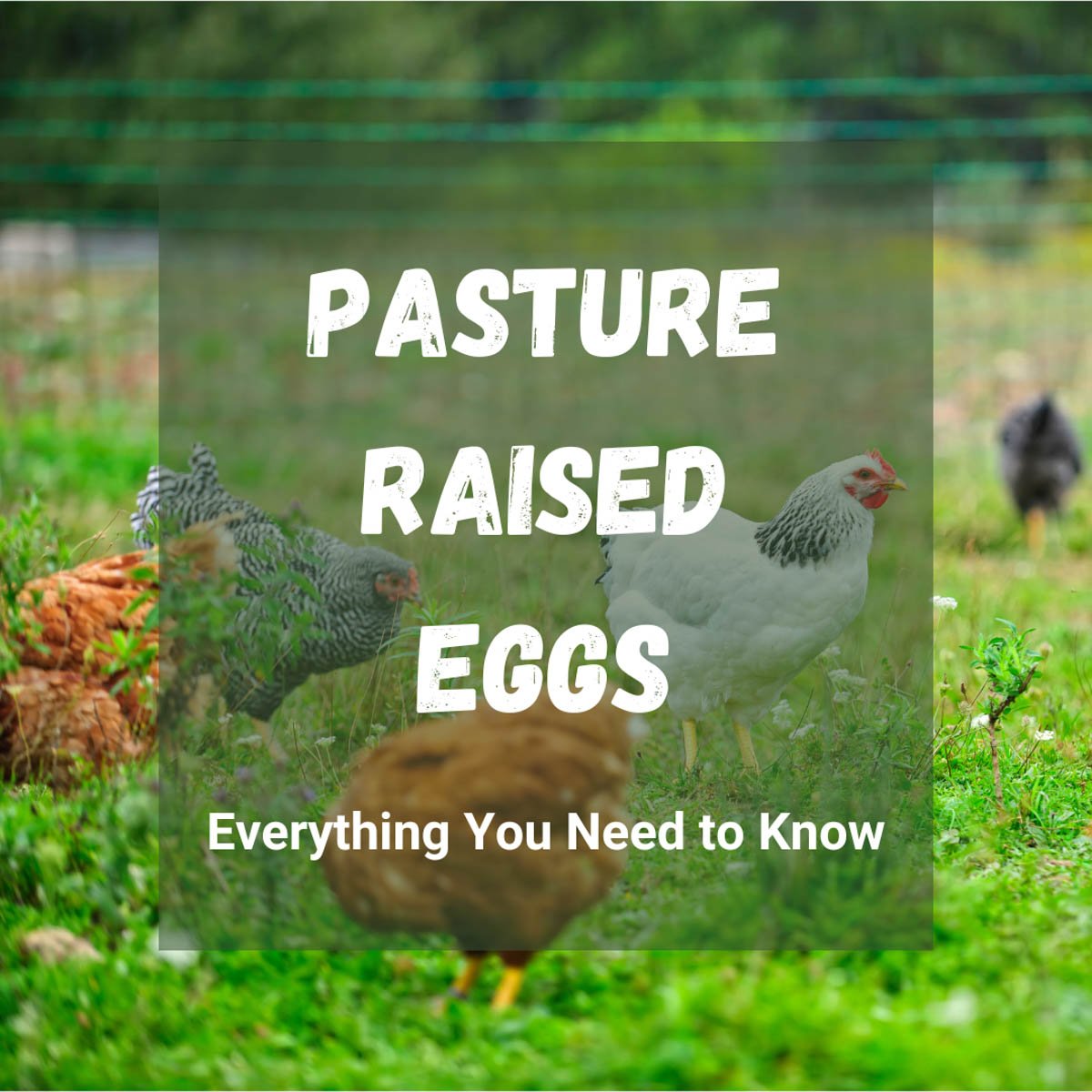
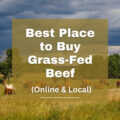

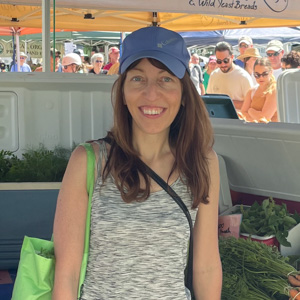
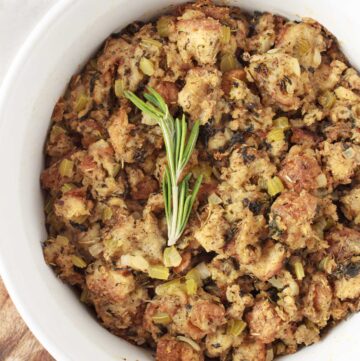
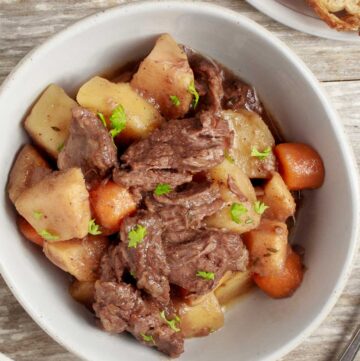
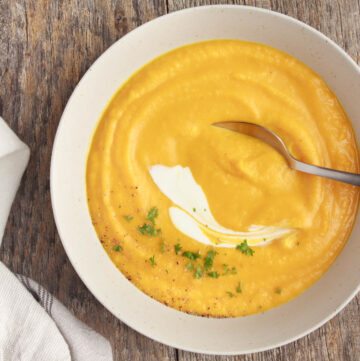
Amazing, thank you for this detailed breakdown!! You’ve inspired me to look at a farmers market for my chicken and grass-fed beef (another article here).
Happy to have planted this seed and kudos to you too!